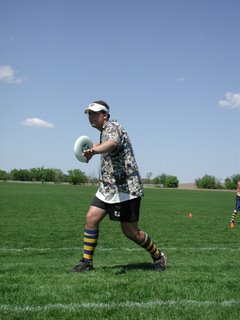A lot has happened in the last couple weeks. A week ago last Friday I finally got a job. It's not the most perfect job ever, but it pays me in real money, the kind that can be traded for goods and services. So after my first week at a new job, my very good friend the Math Avenger comes to town for some Carleton Alumni-take-over-the-world crazy scheme meeting. We hang out, go bowling, I beat Java at air hockey (those of you familiar with this epic struggle will appreciate just how much I enjoyed that, although I don't think Java's heart was really in it-he wanted to be drinking), and we got to watch CUT kick the pants off Madison in the final of the Central Regional Tournament (and then watch the first few points of Syzygy taking it to Iowa). But this weekend was all about Hitchhiking.
I forget when I first read The Hitchhiker's Guide to the Galaxy books-it was probably junior high, althoug it might have been very early high school. They remain among my favorite books, and after reading just about all of Douglas Adams' published works, I can safely say he was one of the most gifted humorists of his generation, and deserves to mentioned in the same breath as P.G. Wodehouse, one of his greatest influences. This means, of course, that any movie adaptation faces the staggering problem of placating the existing base of rabid fans, making a movie that's accessible to the general populous, and staying as true as possible to the source material. The process was helped by the fact that Douglas had been working on turning THHGTTG into a movie for over a decade, and finished a strong draft before he died. More than that, however, the form of the Hitchhiker's story has changed every time it changed mediums. Remember, it began not as a novel but as a BBC radio show. It then made the transition to the stage in the form of three separate productions that took place (I'm 90% sure) before the book came out. Then there was the BBC tv show, and finally after probably about 20 years of trying, a movie. For most people, I think, the book is the gold standard: the "real" story, and for good reason. In my opinion (and isn't that why you're all here?), Douglas' writing has two main strengths: first, he can create situations that are so outrageous that you never would have thought of them yourself, and yet at the same time they seem like the most obvious and hilarious things in the world (or galaxy, rather). Second, his descriptions of familiar concepts and events (like Space, for example) are written in such deft turns of phrase that the reader is caught off guard and bursts out laughing. Douglas is able (in a very different way on a very, very different stage) to do what Wordsworth and Coleridge did in Lyrical Ballads: he shows the familiar in the fantastic and the fantastic in the familiar.
So how does all this translate in the movie? Well, there is of course the loss of some of the atmosphere of the book, since the first two novels don't really have a plot cohesive enough to stand up to a movie. But aside from a bit of disneyfication, a surprising amount of the irreverence has survived. Different things happen than in the book, and the characters are a little different, but like I just said, Hitchhiker's changes whenever it changes mediums. I really like the face-slappy-things on Vogsphere (and no, I don't have a better name for them), I like the direction they went with the Vogons as the ultimate bureaucrats, and I love the Guide voice overs. And really, any serious doubts I had about the movie were erased in the first five minutes, because when the filmmakers turn the dolphins' farewell into a song as fantastic as that one, you know the movie can't possibly have that many problems. I have no idea if Douglas actually wrote the song, but I was struck with the definate impression that he would have been spectacularly happy with at least that one part.
Tuesday, May 03, 2005
Subscribe to:
Comments (Atom)
